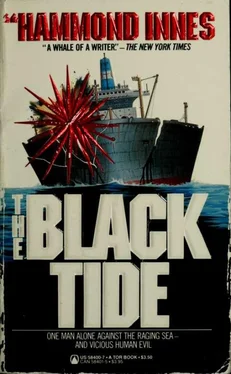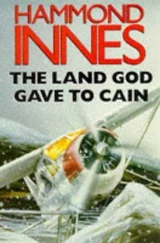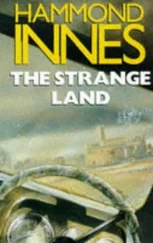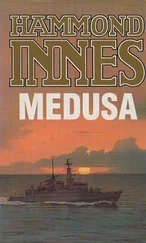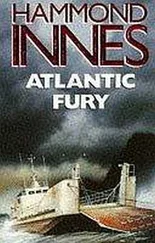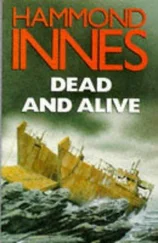Hammond Innes - The Black Tide
Здесь есть возможность читать онлайн «Hammond Innes - The Black Tide» весь текст электронной книги совершенно бесплатно (целиком полную версию без сокращений). В некоторых случаях можно слушать аудио, скачать через торрент в формате fb2 и присутствует краткое содержание. Жанр: Прочие приключения, на английском языке. Описание произведения, (предисловие) а так же отзывы посетителей доступны на портале библиотеки ЛибКат.
- Название:The Black Tide
- Автор:
- Жанр:
- Год:неизвестен
- ISBN:нет данных
- Рейтинг книги:4 / 5. Голосов: 1
-
Избранное:Добавить в избранное
- Отзывы:
-
Ваша оценка:
- 80
- 1
- 2
- 3
- 4
- 5
The Black Tide: краткое содержание, описание и аннотация
Предлагаем к чтению аннотацию, описание, краткое содержание или предисловие (зависит от того, что написал сам автор книги «The Black Tide»). Если вы не нашли необходимую информацию о книге — напишите в комментариях, мы постараемся отыскать её.
The Black Tide — читать онлайн бесплатно полную книгу (весь текст) целиком
Ниже представлен текст книги, разбитый по страницам. Система сохранения места последней прочитанной страницы, позволяет с удобством читать онлайн бесплатно книгу «The Black Tide», без необходимости каждый раз заново искать на чём Вы остановились. Поставьте закладку, и сможете в любой момент перейти на страницу, на которой закончили чтение.
Интервал:
Закладка:
case of fraud — well, it gets quite exciting at times.’ We were crossing the Colne, now a black gut between the white of snow-plastered buildings. ‘Our job is to feed information to the marine solicitors, in extreme cases to the police.’ He grinned at me as we slithered on the roundabout. ‘When Lloyd’s is faced with marine crooks, then it’s our wits against theirs and every case different. It’s teamwork mainly, and sharp memories, a bloody good filing system and a computer.’
He skidded the car to a standstill outside Colchester station booking hall, then scribbled a name and a telephone number on one of his cards and handed it to me. ‘Forthright amp; Co., they’re the marine solicitors for the three syndicates run by Michael Stewart.’ He pushed open the door for me. ‘A Mr Saltley. Give him a ring while you’re in London. He wants to speak to you.’
‘About the Petros Jupiter}’
He hesitated. But all he said was, ‘Just give him a ring, that’s all.’ And he added, leaning across to talk to me as I pocketed his card and stepped on to the hard-packed snow, ‘He’s a nice guy is Michael Stewart. Lives only a few miles away, and if this tanker really has gone missing, then he’s in trouble. That’s what I hear anyway. So go and see Saltley, will you.’ He drove off then, slamming the door shut as the Cortina’s wheels churned the snow, and I went into the station wondering why he thought I could help when all I was interested in was the Petros Jupiter.
CHAPTER THREE
It was just after twelve-thirty when I got back to London. It had been a slow journey with several stops and as I made my way to a call box I was feeling tired and cold, my mind still on the Petros Jupiter, knowing I would have to move fast if I was to catch up with Choffel in Karachi. I hadn’t much money, and an advance on the book was the only chance I had of raising the air fare.
But when I phoned the publishers the man who had written to me had already left for lunch. I made an appointment for three that afternoon, and then, because it was still snowing and I didn’t imagine the sort of lodging I could afford would have a phone, I rang Forthright amp; Co. Again I was out of luck, Saltley’s secretary informing me he was out and she didn’t know when he would be back. She tried to discourage me from ringing later, but when I told her my name, she seemed to brighten up. Mr Saltley, she said, would definitely like to see me, and as soon as possible. He
was attending a twenty-first birthday luncheon party at the Savoy and would be back by four at the latest. Could I ring again then?
I had some food at the station buffet, then got my suitcase out of the lock-up and took the tube to Stepney Green. Outside the station the Mile End Road seemed strangely quiet, the sound of the traffic muffled by a dirty carpet of salted slush. I crossed the road and headed south for a boarding house I had used before. It was in a long street of terraced houses down towards the river, and when I knocked at the door, it was opened by the same big-bosomed, bold-eyed landlady. I had forgotten her name until she reminded me. It was Mrs Steinway. She put me in the basement, which was the only room she had vacant and, after settling in and having a quick cup of tea with her, I walked back through the snow to Stepney Green station and took a train to South Kensington.
Jordans, the publishers to whom I had sent my book, were a small firm specializing in wildlife and natural history. It was just after three when I reached their office in Queen’s Gate, one of those white porticoed buildings almost opposite the Natural History Museum. A pretty little girl with a streaming cold took me up to Ken Jordan’s office on the first floor, which was little bigger than a partitioned cubicle, the ceiling showing part of the ornate plaster design of a larger room. There was a window looking across to the Museum and the walls were lined with bookshelves that overflowed into stacked heaps on the floor.
Jordan proved to be a rather intense individual
with sandy hair and eyes too close together, his face long and the lips turned up at the corners in what appeared to be a perpetual smile. He had my typescript on the desk in front of him, on top of an untidy litter of books, letters and galleys, and as soon as I was seated, instead of talking about my book he went into a long monologue about the one I ought to write. ‘You owe it to your wife.’ He said that several times. He wanted me to start again, writing the whole story of Balkaer from Karen’s point of view…
‘Write it in the first person. Imagine you’re really your wife, everything from her angle, right?’ His pale, rather protuberant eyes stared at me urgently. ‘I’m sure you can do it. Her feelings as she’s cleaning up those half-dead birds, what she thinks about the government, the oil companies, the men who run the tankers, how the idea gradually forms in her mind — immolation, a spectacular, suicidal gesture—’
‘It wasn’t suicide,’ I said quickly.
‘No, no, of course not.’ He gave a high little laugh, almost a giggle. ‘But that’s how the public see it now. And it’s the public that buy books. So you give them what they want, use your imagination. A little invention. Dramatize it. Build it up.’ And then he had the nerve to ask me whether she had tried it before.
‘How do you mean?’ I could hear the hostility in my voice, feel anger building up inside me.
‘Just that. Had she tried it before—’ He stopped there and opened the folder, leafing through the pages Karen had typed so carefully. ‘That oil slick you described. Not the first one.’ He found the page he
was looking for. It was near the end. ‘The one in November. Now, if she tried to set fire to it and failed … you see what I’m getting at? It would make it so much more dramatic — her feelings when it didn’t work, the sense of anti-climax.’ He paused, staring at me. ‘A nice build-up, you see, to the end of the book — very exciting, very moving … the reader having been through it all before when it didn’t work, and then, the next time, knowing it’s for real, that she’s going to kill herself.’
‘She didn’t mean to,’ I said again. ‘She wasn’t thinking of suicide, only of setting light—’
‘No, but you see what I’m getting at. So dramatic, eh? And that’s what you want, isn’t it, to make the point she was trying to make? The news story, that’s over, finished now. What we want is something much more personal, something deeply moving.’ He was leaning forward, his voice quiet and persuasive. ‘I’m sure you can do it, Mr Rodin. It’s just a question of putting yourself in your wife’s — er, sea boots—’ he smiled, trying to lighten his words — ‘seeing it as she might have seen it, and building the whole thing up, dramatizing it, making it exciting, sensational even — it needs fictionalizing, you see.’
‘You aren’t interested then in what I’ve already written?’
‘No.’ He shook his head. ‘No, not really.’ And he added quickly as I began to get to my feet, ‘It’s nicely written. Don’t misunderstand me. You can write. But these are difficult times. I don’t think we could sell it, not now. But the book I’ve just outlined … I’m sure
we could sell that. It has excitement, emotional involvement, action — it could be a very moving book. We could try one of the Sundays too. It could make a good two or three-part serial.’
‘But not if I wrote it the way I saw it, the way it really happened?’
He shook his head. ‘No.’ He banged the typescript shut. ‘What we’re talking about is a first book. Trevor Rodin. Nobody’s heard of you, you see. You’re new, unknown. So we’ve got to give it depth, excite people, give the reader something to get his teeth into — husband writes the full intimate story of his wife’s final, terrible decision. See what I mean? It’s moving. It would tear at their hearts—’
Читать дальшеИнтервал:
Закладка:
Похожие книги на «The Black Tide»
Представляем Вашему вниманию похожие книги на «The Black Tide» списком для выбора. Мы отобрали схожую по названию и смыслу литературу в надежде предоставить читателям больше вариантов отыскать новые, интересные, ещё непрочитанные произведения.
Обсуждение, отзывы о книге «The Black Tide» и просто собственные мнения читателей. Оставьте ваши комментарии, напишите, что Вы думаете о произведении, его смысле или главных героях. Укажите что конкретно понравилось, а что нет, и почему Вы так считаете.
